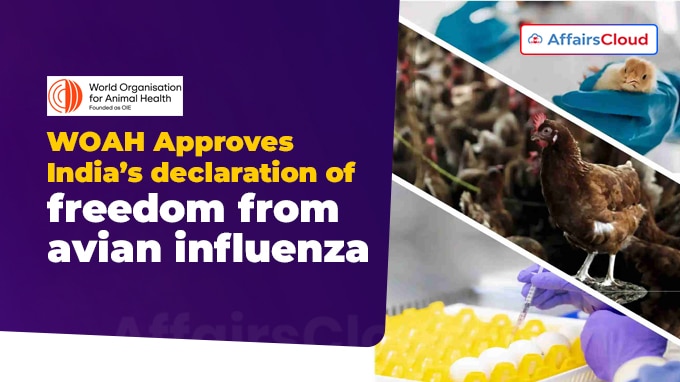 The World Organisation for Animal Health (WOAH) has approved India’s self-declaration of freedom from Highly Pathogenic Avian Influenza (HPAI), commonly known as bird flu, in certain poultry compartments (approved farms) in Maharashtra, Tamil Nadu, Uttar Pradesh, and Chhattisgarh.
The World Organisation for Animal Health (WOAH) has approved India’s self-declaration of freedom from Highly Pathogenic Avian Influenza (HPAI), commonly known as bird flu, in certain poultry compartments (approved farms) in Maharashtra, Tamil Nadu, Uttar Pradesh, and Chhattisgarh.
- This recognition by WOAH signifies India’s dedication to international biosecurity standards.
- This recognition is composed to boost India’s poultry industry by enhancing the export potential of poultry products, such as meat and eggs.
- The self-declaration approved by WOAH coincided with World Egg Day on 13 October 2023.
What is Avian Influenza (AI)?
i.AI is a highly contagious viral disease impacting domestic and wild birds. It can occasionally infect mammals, including humans.
ii.The many strains of AI viruses can generally be classified into 2 categories according to the severity of the disease in poultry:
- Low Pathogenicity Avian Influenza (LPAI): Typically causes little or no clinical signs;
- High Pathogenicity Avian Influenza (HPAI): Can cause severe clinical signs and possible high mortality rates.
iii.AI outbreaks in poultry can have immediate and severe consequences for the agricultural sector.
i.In India, it was first detected in the state of Maharashtra in February 2006.
ii.Since then, India has experienced annual outbreaks of HPAI in different regions, causing significant economic losses.
iii.HPAI has been reported in 24 states and Union Territories (UTs). It has necessitated the culling of over 9 million birds to control its spread.
India’s Approach to Controlling HPAI:
i.Follows a “Detect and cull” policy emphasized in the National Action Plan for Prevention, Control, and Containment of Avian Influenza (revised – 2021).
ii.The comprehensive response includes the humane destruction of infected and exposed animals, eggs, feed, litter, and contaminated materials.
iii.Measures include movement restrictions for poultry and poultry products, premises disinfection, and clean-up.
iv.Implementation of a Post-Operative Surveillance Plan (POSP) for effective monitoring.
v.Highlight that vaccination against HPAI is not permitted in India, underlining the significance of other control measures.
Compartmentalization:
i.It is a strategic technique implemented to ensure the health and safety of poultry and related products.
ii.It involves defining a sub-population of animals with a specified health status within the national territory.
iii.India has proactively embraced compartmentalization to combat the risks of HPAI.
Benefits of Compartmentalization:
- Mitigates risks associated with HPAI.
- Enhances animal health within designated compartments.
- Minimizes the threat of disease spread beyond the compartment.
- Facilitates smoother poultry trade and associated product exchange.
Key Points:
i.India ranks 3rd globally in egg production (129.60 billion) and ranks 5th globally in poultry meat production (4.47 million tonnes).
ii.During the 2022-23 fiscal year, India exported poultry and poultry products to 64 countries and generated a revenue of 134 million USD.
iii.The approval of this self-declaration is expected to unlock new global market opportunities for Indian poultry, contributing to India’s economic growth.
Recent related News:
On 28th June 2023, the Food and Agriculture Organization of the United Nations (FAO), the United Nations Environment Programme (UNEP), the World Health Organization (WHO), and the World Organisation for Animal Health (WOAH), “the Quadripartite organisations”, launched “A One Health Priority Research Agenda for Antimicrobial Resistance (AMR)” through a webinar. The Research agenda aims to promote increased research and investment in AMR.
About World Organisation for Animal Health (WOAH):
Director-General– Dr Monique Éloit
Headquarters– Paris, France
Members – 183 Members (As of October 2023)
Founded in 1924 as the Office International des Epizooties (OIE), in May 2003 adopted the common name World Organisation for Animal Health.




